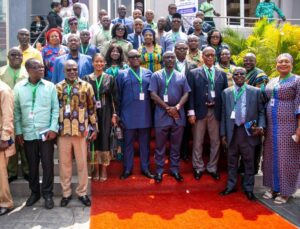“We control a substantial portion of the Ghanaian economy… It is not about the big things; it is the little things that we are not doing that have put us all in this position. “It is our problem, and we all have to work hard to jump-start the economy.”
These were the words of Ambassador Edward Boateng, Director-General of the State Interests and Governance Authority (SIGA), as he rallied the leadership of the various specified entities to “put their best foot forward” and support efforts by the government to put the economy back on track.
The Chief Executive Officers and Board Chairs of the State-owned Enterprise (SOEs) gathered at Kwahu Nkwatia in the Eastern Region for SIGA’s Annual Stakeholder Meeting, which was in accordance with Section 30 of the SIGA Act 2019 (Act 990).
The Stakeholder Meeting, which was on the theme: ‘A Time to Reflect and Rebuild’, discussed challenges affecting the SOEs and ways the entities could improve their performance and achieve the president’s vision of contributing 30 percent to Ghana’s gross domestic product.
It was a perfect atmosphere to echo the important role that SOEs play in the development of the nation, and it emphasised the need for the entities to comply with the directives of SIGA and strive to meet certain performance targets.

Since assuming the position of Director-General, Ambassador Boateng has implemented wide-ranging policies with the aim of restoring hope in the SEOs and pushing them to be more accountable to achieve profitability.
Key among them was the consistent engagement with the leadership of the specified entities, the signing of performance contracts with the entities, and the implementation of the Public Enterprises League Table to engender competition among the SOEs.
Ambassador Boateng told journalists at the conference that there had been an improvement in the performance of SOEs, especially with the rate of compliance with the submission of management accounts mandated by law. “Just two years ago, if you look at the national accounts, only five SOEs were presenting their accounts, and that contributed very minimal. Last year, in 2022, we were able to push it to 47, bringing their contribution to 21 percent,” he explained.
Ambassador Boateng led by example when he arranged for the CEOs and Board Chairs to be conveyed by STC buses to the conference to cut cost. He told the participants that the move saved the authority about GH¢100,000 on fuel.
Ambassador Boateng charged the specified entities to publicise their success stories to enable the public to know the efforts they are making to improve their performance and to erase the negative reportage about SOEs over the period. “You must be intentional about your communication. “Nobody will know about the good things you are doing until you tell them,” he said.
President Nana Addo Dankwa Akufo-Addo, who was the Special Guest of Honour at the event, commended SIGA for the instrumental role it is playing to reverse the trend and ensure that SOEs achieve sustainable profitability. He extolled SIGA for doing a “yeoman’s job” by pushing for compliance on the submission of management accounts on the part of the SOEs to consolidate the national accounts.
President Akufo-Addo charged the SOEs to submit all their management accounts to the Controller and Accountant General’s Department by February 28, 2023. He also directed the SOEs to submit to SIGA’s performance contract process to facilitate the inclusion of their financial statements in the preparation of the national accounts.
Mr. Joseph Cudjoe, Minister of Public Enterprises, charged the SOEs to collaborate effectively and double their work efforts to achieve their target of contributing 30 percent to the GDP. “Contributing 30 percent to the GDP is Herculean, but we shall succeed with determination… let us not lose sight of effective collaboration in our rebuilding process,” he said.
The number of financial statements submitted by SOEs in the consolidated national accounts rose from 19 in 2020 to 47 in 2021. In 2020, the 19 SOEs included in the national accounts contributed 30 percent to the national assets. It further increased to 49 percent when 47 SOEs were included in the 2021 national accounts.










